Trigger Warning and Disclaimer: the content that you are about to read contains graphic and sensitive experiences. The opinions expressed in this piece solely reflect the author's views and not Andariya's. Reader discretion is advised. Read our full editorial notice here.

Sudan is experiencing a significant outbreak of dengue fever amid its ongoing humanitarian crisis. Since the outbreak intensified, dengue has spread widely across states like Kassala and Khartoum. In Omdurman alone, over 7,600 cases have been confirmed, resulting in at least 253 deaths, with thousands more suspected cases as of October 16. Kassala has also been hard-hit, accounting for about half of the country’s total dengue cases, which continue to rise as healthcare services struggle due to conflict and limited resources.
The war that started on April 15, 2023, is considered to be the most devastating humanitarian disaster in Sudan's history since independence. The fighting marked a turning point for a nation that had endured political and economic turmoil for the past five years.
The armed conflict over who is in charge of the country erupted between the Sudanese Army (SAF) and the Rapid Support Forces (RSF) in the capital, Khartoum. It quickly spread to several states, claiming the lives of tens of thousands of innocent people and displacing millions.
The consequences of the war are horrific and can be seen in the infrastructure features of factories and hospitals, as well as educational and government facilities. All of these hostile actions had the greatest impact on preventing vital healthcare institutions from serving.
An estimated 150,000 people have lost their lives, and up to 12 million have been displaced. The impact of the war has been devastating, with half the country facing starvation and a distressing health crisis.
The Impact of the Conflict on Sudan's Health Sector
Sudan is facing a health crisis as the conflict continues to devastate the medical infrastructure. According to the International Committee of Red Cross (ICRC), two out of three Sudanese civilians no longer have access to essential health services as a result of the country's hospitals and health centers being forced to close their doors. Many service providers, including doctors and nurses, have been targeted, and many health facilities have been damaged by shelling and airstrikes since the conflict broke out in April last year.
Citizens in conflict areas face difficulties and risks that make accessing hospitals and receiving treatment almost impossible. Some hospitals have been converted into housing by the RSF, where their wounded are treated. The remaining facilities are operating with limited capabilities due to the lack of medical personnel and the limited stock of medical equipment that provides only 25% of the needs.
The situation in conflict areas is similar to a siege, as the ongoing violence in those areas hinders citizens' movement and life in general. As battles continue, humanitarian aid may not be able to arrive, which further exacerbates the plight of citizens, including children, where their lives are at risk due to the lack of basic food supplies, which weakens their ability to resist diseases.
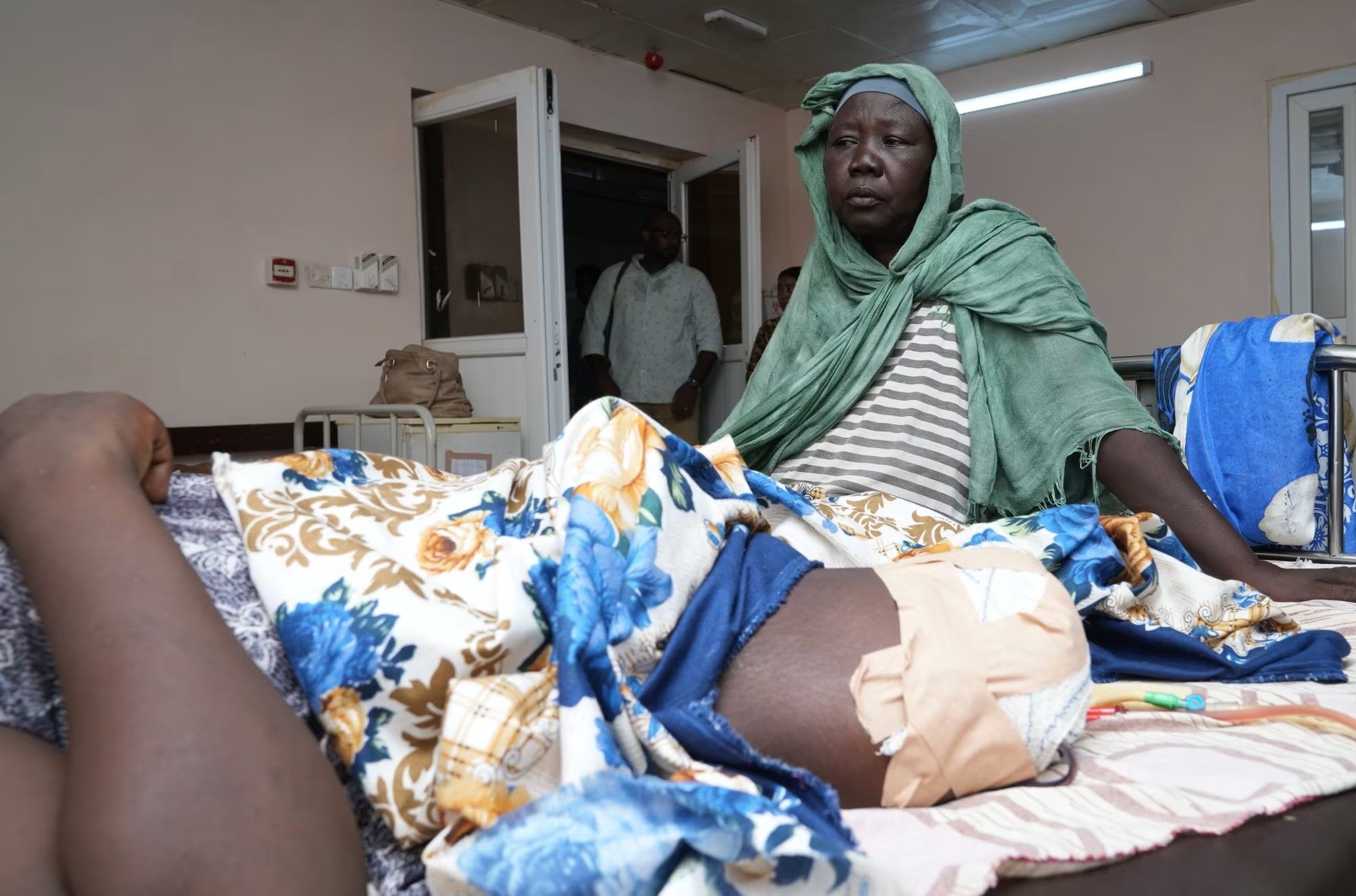
A 15-year-old girl recovers from the amputation of her right leg, lost after a stray bullet hit an artery. Source Ahmed Farfoor/Financial Times
Food and Health
Food is the primary factor in maintaining human health and safety, as it provides the body with the required nutrients to maintain health, life, and the necessary protection from the risk of disease. On the contrary, food shortages and malnutrition lead to deterioration of immunity and exposure to diseases.
The World Health Organization has classified Sudan as one of the countries suffering from acute food shortages, as more than 40% of Sudan’s population, or approximately 19 million people, face high levels of acute malnutrition and suffer from hunger, and about 3.6 million children under the age of five suffer from acute malnutrition, according to the World Food Program in Sudan.
Malnutrition, hospital malfunctions, and the disaster of corpses and medical waste on the roadsides are factors that contributed to the increase in the spread of diseases in light of the lack of preventive care for diseases. Reports issued by the World Health Organization in May of this year recorded 1.3 million cases of malaria, 11,000 cases of cholera, more than 4,600 cases of measles, and about 9,000 cases of dengue fever in Sudan.
With 65% of Sudan's population lacking access to health care and rising rates of famine and disease, the "horrific violence-threat of famine and disease" syndrome haunts those trapped in areas of active conflict, including residents in Khartoum, Al-Gezira, and several states of the Darfur region.
How Dengue Fever is Spread, Symptoms and Treatment
Dengue fever is a viral infection that is transmitted to humans when they are exposed to the bite of mosquitoes carrying the disease. It's widespread in tropical and subtropical climates.
Climate change, high temperatures, and increased rates of rainfall and humidity are some of the factors behind the increased risk of the spread of the disease. According to the World Health Organization, the highest number of dengue fever cases was observed in 2023, affecting more than 80 countries, and the number of cases exceeded 6.5 million, resulting in more than 7,300 deaths.
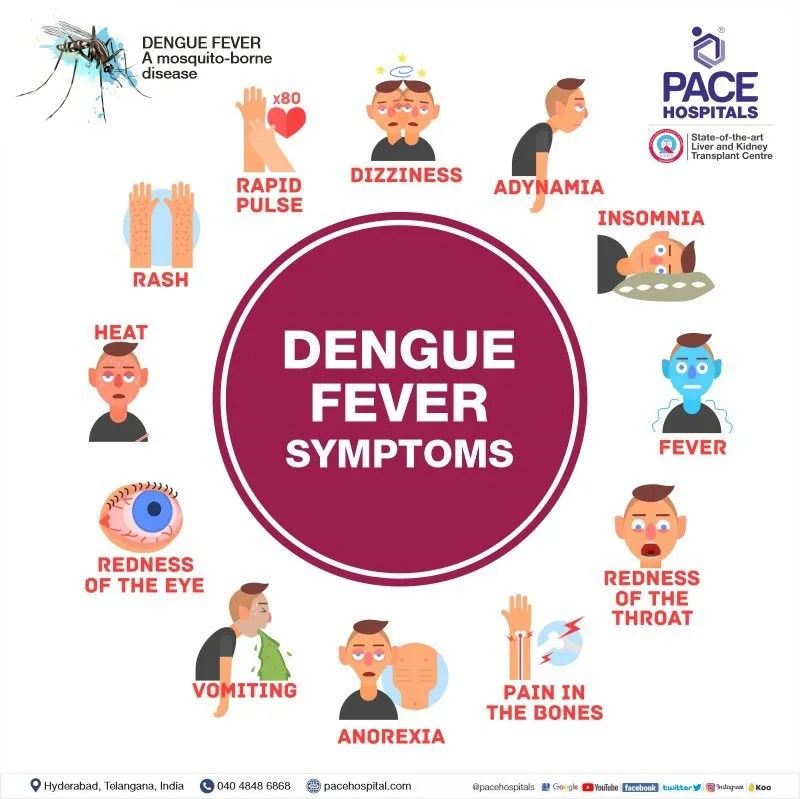
Symptoms of dengue fever. Source: PACE Hospitals
Symptoms of dengue fever typically appear 4 to 10 days after infection and include high fever, severe headache, muscle and joint pain, nausea, and skin rash. To manage dengue fever, it's important to stay hydrated by drinking plenty of fluids, eating a nutritious diet, using acetaminophen (paracetamol) to relieve pain and fever, getting plenty of rest, and avoiding anti-inflammatory drugs like aspirin or ibuprofen. Patients are recommended to always consult a healthcare professional for proper diagnosis and treatment.
Statistics on dengue fever in Sudan from 2019-2024
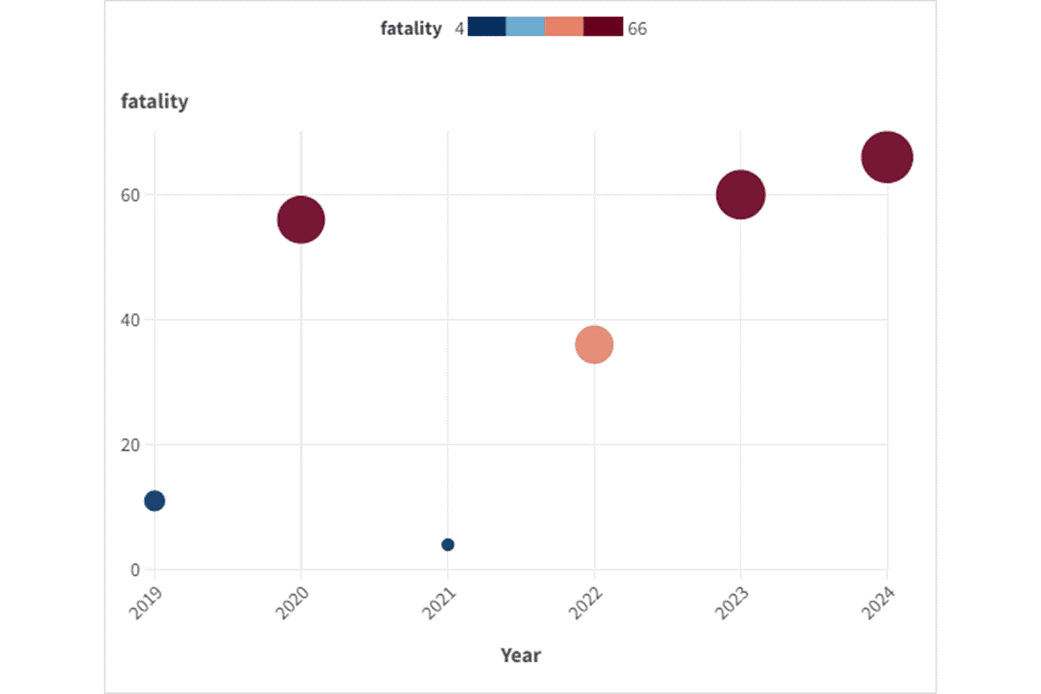
A graph showing the number of deaths due to Dengue fever in Sudan throughout the years (2019 - 2024)
The year 2022 witnessed the largest outbreak of dengue fever in the history of Sudan, according to what was reported by the Federal Ministry of Health, as the number of cases exceeded 6,000 and there were more than 30 deaths. North Kordofan state recorded 1,427 suspected cases and 13 deaths, which is the most affected state compared to other states.
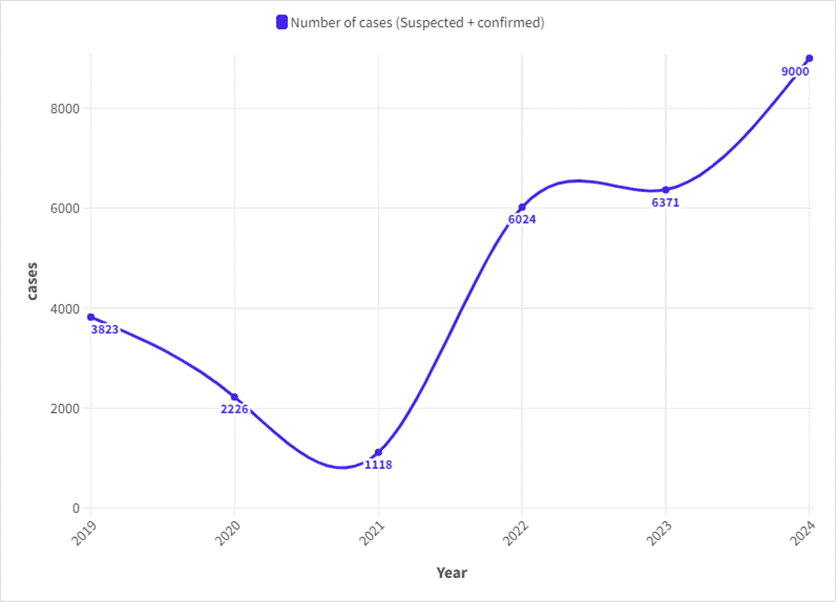
A Graph showing the number of cases recorded throughout the years (2019 - 2024). Data visualisation by Eltayeb Haj-Ahmed
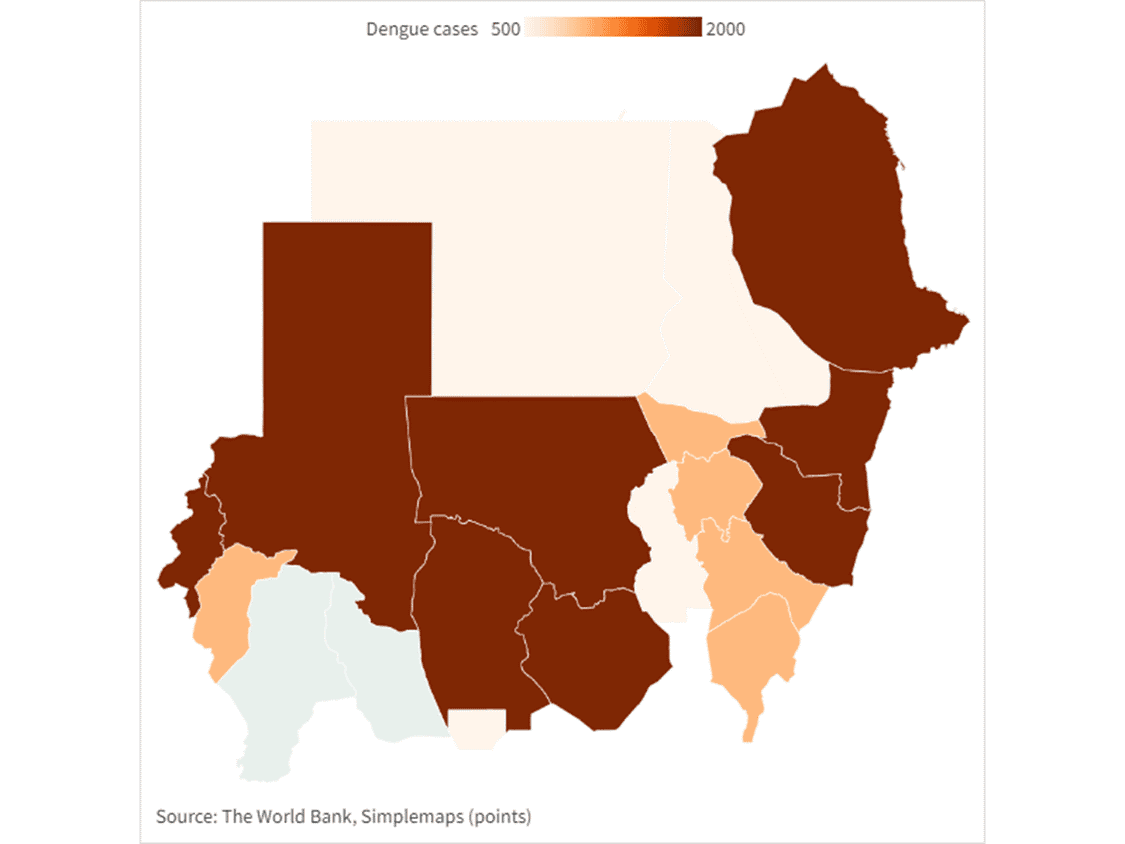
A map showing the most affected regions with Dengue Fever as of July 2024. Data visualisation by Eltayeb Haj-Ahmed.
Dengue Fever is Sweeping Neighborhoods in North Bahri
According to the Samarab emergency room, at least 186 people have died by October 25th, 2024, from an outbreak of dengue fever in the Samarab district of Khartoum North, and around 500 cases of the mosquito-borne viral infection have been recorded since July. In the Soba East area of Khartoum, the East Nile Emergency Room on November 9th reported the deaths of six people and confirmed at least 32 cases of dengue fever. All this as fighting between SAF and RSF continues to rage.
The residents of the city of Bahri have become immune to the artillery sounds and aerial bombardment. Their minds are no longer occupied by the noises of military aircraft and the explosion of shells as they have become accustomed to the scene. However, the emergence of dengue fever and its pervasive spread seemed like a new specter threatening the lives of the residents. The population's true suffering is not caused by the disease and its symptoms but due to the lack of necessary health care and medications that can reduce the severity of the disease.
The Bahri Emergency Room stated that hospitals being out of service is a major impediment to confirming dengue fever due to the similarity of dengue fever symptoms to malaria. As a result, the Bahri Emergency Room consulted a doctor affiliated with the World Health Organization to explain to medical staff the method of checking for dengue fever and work on that. Dengue fever is diagnosed through a Complete Blood Count (CBC) blood test, and the results are confirmed to be either dengue fever or malaria.
In the same context, the Bahri Emergency Room stated that supplying the required medications, including chronic disease medications, in addition to pendulum, salt, and glucose tablets, is a significant challenge.
It is worth noting that these neighborhoods have been under the control of the RSF since the beginning of the war in April 2023. As they recorded an increase in cases of dengue fever and cholera, they also suffered from food shortages and lack of drinking water because the water station stopped working, adding to that, hospitals are not functioning.
Conclusion
The current dengue fever outbreak in Sudan underscores the significant public health challenges exacerbated by ongoing humanitarian crises. To effectively address this immediate health crisis and its underlying causes, urgent measures are necessary. These include robust vector control strategies and enhanced public health interventions.
Individuals can play a crucial role in prevention by taking the following precautions:
• Personal Protection: Wearing protective clothing, using mosquito repellents, and reducing exposure to mosquito-breeding sites.
• Waste Management: Proper disposal of household and healthcare facility waste.
In case of infection, individuals should prioritize:
• Rest and Hydration: Adequate rest and fluid intake.
• Nutrition: A balanced diet to maintain strength and prevent nutrient deficiencies.
To further mitigate the impact of dengue fever, widespread awareness campaigns are essential to educate the public about:
• Symptoms: Recognizing the signs and symptoms of dengue fever.
• Prevention: Implementing effective preventive measures.
• Treatment: Seeking appropriate medical care and following recommended treatment protocols.
By combining these strategies, it is possible to control the outbreak and reduce its impact on public health.